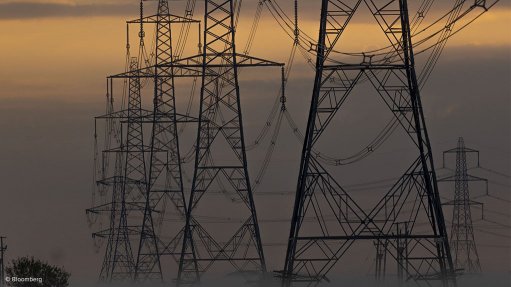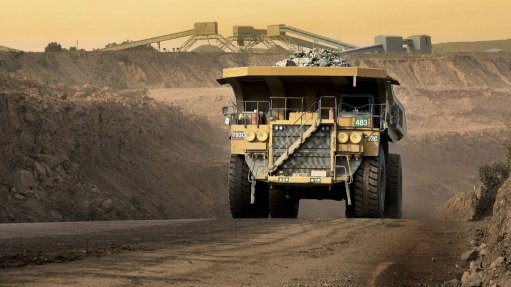26/04/2013 (On-The-Air)
Every Friday morning, SAfm’s AMLive’s radio anchor Xolani Gwala speaks to Martin Creamer, publishing editor of Engineering News and Mining Weekly. Reported here is this Friday’s At the Coalface transcript:
Gwala: Generating electricity from coal that remains underground and is not mined and brought to surface is an exciting new South African initiative.
Creamer: It is something that you don’t physically mine the coal, but you have chemical process that gives you the gas from the coal. The two entrepreneurs involved there is Johan Brand and Eliphus Monkoe, both ex-Sasol executives bought a deposit in the Free State from BHP Billiton. So, they have got about 1,4-billion tons of coal there.
This is what they call stranded coal. People regard it as being too deep, so you are not going to get anything out of it. They say that we are going to get something out of it, more economically than mining coal and then we can generate electricity from that. Y
ou use some of the methods used in the oil and gas industry to access this coal and then you ignite it underground. There is ignition underground and people are often scared of that, because they are saying that that you don't light fires with coal. You actually battle to keep that ignition process on the go that creates a synthetic gas and then you pipe this synthetic gas to the surface and you use that as your fuel for power generation.
They are advanced this company. African Carbon Energy has been in existence since 2007 and working on this and they are going to bid on the next Eskom PPA, when they invite the independent power producers in for base-load. So they are coming in first moderately on a 50 MW plan but they are saying that they believe that they can go further with this because already it is competitive, because it beats coal mining.
Their project is going to be at a lower cost. Eskom is up 61 cents a kilowatt-hour. They believe that they can be competitive without any rebates and they believe that once they get into this further and also exploit it further, because it is a bit of a tragedy to burn this coal gas, which is called underground coal gasification.
We know that Sasol gets so much more out of it like diesel, petrol and chemicals. They are looking not only at South Africa, but Southern Africa where there is a lot of potential for stranded coal to actually have a poly-generation where you use certain coal-gas for power generation, but the other gases to produce petrol, diesel and chemicals, in the same way Sasol does.
Gwala: Petroleum giant BP’s announcement that it will invest billions of rands in Southern Africa helped to allay worrying fears about declining fuel security.
Creamer: We have been worrying about fuel security. We know that our demand for refined fuel has been exceeding our capacity in South Africa to produce refined fuel.
That is always a danger because you have got to start importing,with weak rands. You have got to reach a critical mass, so we are at a stage where we actually need the demand to grow a bit more, before we can take a decision on a new refinery. But, that is bound to come.
In the meantime, it is a very welcome decision by British Petroleum, because a lot of these big petroleum companies has been hanging back for regulatory certainty and policy certainty. BP has decided to go ahead now with R5,5-billion investment in Southern Africa. The R4,7-billion coming into South Africa and R800-million into Mozambique. It is in the region and it is an expression of confidence in this region.
The big amount is going to go into upgrading the refinery capacity at Sapref, which is joint BP and Shell, which means Shell will also have to be chipping in. BP are going to put in R2,5-billion and it will give us this cleaner transport fuel which we have been waiting for.
That puts us in a more secure spot because Euro V means that if we are needing more fuel and we’re used to that specification, we can now import in so that we don't have that same fuel uncertainty. But, the cleaning process gets rid of the sulphur, benzenes and aromatics, what we have been waiting for.
It has been started by Iain Conn, the CEO of Refining and Marketing for BP which announced this. It is quite significant because he is the nephew of the late anti-apartheid campaigner and Black Sash stalwart, Sheena Duncan. It was quite interesting that he should come and do this.
Another interesting side to this is that besides the refining capacity upgrade, there will also be R1-billion in new fuel terminals and R2-billion to upgrade the retail network and we can see Pick n Pay coming in here with 120 Pick n Pay express stores also involved in this.
Gwala: South Africans are playing a key role in the building of the new airport on the island of St Helena.
Creamer: Its been like dead in the water. Napoleon was imprisoned there by the British and there has been like 500 years of nothing happening on St Helena. People have been resisting change, the 4 000 people on the island don’t want to change. But, of course, it is costing Britain about £25-million a year to just get the goods and services going in there.
There is only one ship that feeds it and it takes five days from Cape Town to St Helena. Now we have the South Africans in the form of the construction company listed on the Johannesburg Stock Exchange, Basil Read, coming in to build a new airport there. You can say that they are building the new airport by ship.
They are working from Walvis Bay and the island is 2 000 km from Walvis Bay. The ship takes construction equipment and about 70 000 tons of goods will have to be transported across. It takes five days to get across. Then seven days to get back because of the currents and the winds. So you don't dare leave anything out, because otherwise your 21-day cycle gets further.
South Africa’s Basil Read doing this and they are not only going to build this airport, but they are also going to operate it for ten years. Some 70% of the people on the island now support this airport that they are going to build on the island. Initially the referendum went against it. Britain is putting in £250-million and this is a British Overseas Territory and the idea is to get a little bit more economic activity on the island especially tourism.
The airport will do that, instead of 1 000 visitors a year, taking it up to 29 000 to 30 000 visitors a year, which they feel will have a tremendous tourism spin-off.
Gwala: Thanks very much. Martin Creamer is publishing editor of Engineering News and Mining Weekly, he’ll be back with us at the same time next week.
Comments
Press Office
Announcements
What's On
Subscribe to improve your user experience...
Option 1 (equivalent of R125 a month):
Receive a weekly copy of Creamer Media's Engineering News & Mining Weekly magazine
(print copy for those in South Africa and e-magazine for those outside of South Africa)
Receive daily email newsletters
Access to full search results
Access archive of magazine back copies
Access to Projects in Progress
Access to ONE Research Report of your choice in PDF format
Option 2 (equivalent of R375 a month):
All benefits from Option 1
PLUS
Access to Creamer Media's Research Channel Africa for ALL Research Reports, in PDF format, on various industrial and mining sectors
including Electricity; Water; Energy Transition; Hydrogen; Roads, Rail and Ports; Coal; Gold; Platinum; Battery Metals; etc.
Already a subscriber?
Forgotten your password?
Receive weekly copy of Creamer Media's Engineering News & Mining Weekly magazine (print copy for those in South Africa and e-magazine for those outside of South Africa)
➕
Recieve daily email newsletters
➕
Access to full search results
➕
Access archive of magazine back copies
➕
Access to Projects in Progress
➕
Access to ONE Research Report of your choice in PDF format
RESEARCH CHANNEL AFRICA
R4500 (equivalent of R375 a month)
SUBSCRIBEAll benefits from Option 1
➕
Access to Creamer Media's Research Channel Africa for ALL Research Reports on various industrial and mining sectors, in PDF format, including on:
Electricity
➕
Water
➕
Energy Transition
➕
Hydrogen
➕
Roads, Rail and Ports
➕
Coal
➕
Gold
➕
Platinum
➕
Battery Metals
➕
etc.
Receive all benefits from Option 1 or Option 2 delivered to numerous people at your company
➕
Multiple User names and Passwords for simultaneous log-ins
➕
Intranet integration access to all in your organisation




















